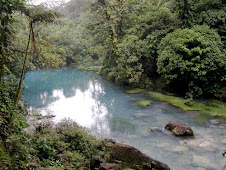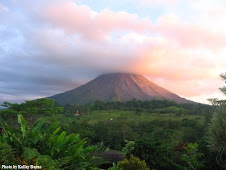It's not quite what you expect.
Soda is Costa Rican for diner.
Sodas in Costa Rica won't give you a menu because the fare is pretty standard from one place to the next. Most places will send a waitress (
salonera) to your table and ask you to simply come up with your order on your own.
Most people will order a "
casado", which is a fixed plate that consists of rice, beans, a few sides, some plantains (green or ripe), and your choice of meat.
The sides can consist of a chopped up casserole dish called "
picadillo" or an "
ensalada rusa" (Russian salad), which consists of chopped up beets and hard-boiled eggs in a creamy sauce.
The meat choices can include the following:
- Carne en salsa (literally "meat in sauce", kind of like a thick stew or a pot roast)
- Pollo en salsa (usually a single piece of chicken cooked in a light chicken gravy)
- Pollo frito (a piece of fried chicken)
- Pescado (fish, most often fried)
- Chuleta (pork chop)
When ordering a
casado you only need to say "
un casado con ______", with the blank filled by one of the aforementioned meats. "
Un casado con chuleta", for example, would be what you order if you want the fixed meal with a pork chop. You can also order a "
un casado vegetariano", which will most likely be the typical base-case
casado with just more of everything, but no meat of course.
You can also order items
a la carte. The only difficulty is that you have to spell everything out for the waitress. (As a side note, yes, most soda waitstaff is female.) For example, you could say:
"
Regáleme arroz, frijoles, pollo en salsa, unos maduros, ensalada rusa y un huevo frito"
Translation: "Gift me rice, beans, chicken in sauce, some ripe plantains, Russian salad, and a fried egg"
(Please note that "
regalar", which literally means "to gift", is the most common way to ask for something in Costa Rican culture, even when you intend to pay for something.)
When you're ordering a drink, you're expected to order a soft drink, coffee (if it's breakfast time), or one of their "natural" drinks called "
frescos naturales". The
frescos are a mixture of some natural source of flavor--usually fruit--mixed with water and sugar. You might be overwhelmed by all of your choices. Among those choices will be some of the following:
- Fresco de piña (pineapple)
- " " zanahoria (carrot)
- " " chan (the seed of the chan fruit)
- " " linaza (linseed)
- " " mango (mango)
- " " avena (oatmeal)
- " " mora (blackberry)
- " " maracuyá (passion fruit)
- " " carambola (starfruit)
- pinolillo (finely ground roasted corn and cacao)
This should be enough for you to survive your first trip to a Costa Rican
soda. However, please note that your experience on the Caribbean side might be different. While the process might be quite similar, the actual food will likely be much different, but that can be the topic for another blog post.
Happy eating :)


